Stakeholder Interests: An Analysis of Directors' Duties in Governance
VerifiedAdded on 2023/06/09
|12
|2949
|167
Report
AI Summary
This report analyzes the duties of company directors to consider the interests of all stakeholders, referencing the Corporations Act and the ASX Principles of Good Corporate Governance. It examines the existing legal framework, using cases like James Hardie and Rocky Lamattina and Sons Pty Ltd to illustrate the obligations and potential impacts of over-regulation. The report also discusses the balance between shareholder and stakeholder interests, the role of self-regulation, and the need for flexibility in decision-making. It concludes that current laws sufficiently encourage directors to consider stakeholder interests for the overall benefit and sustainability of the companies.

Running head: CORPORATE GOVERNANCE
Corporate Governance
Name of the Student
Name of the University
Author’s Note
Corporate Governance
Name of the Student
Name of the University
Author’s Note
Paraphrase This Document
Need a fresh take? Get an instant paraphrase of this document with our AI Paraphraser
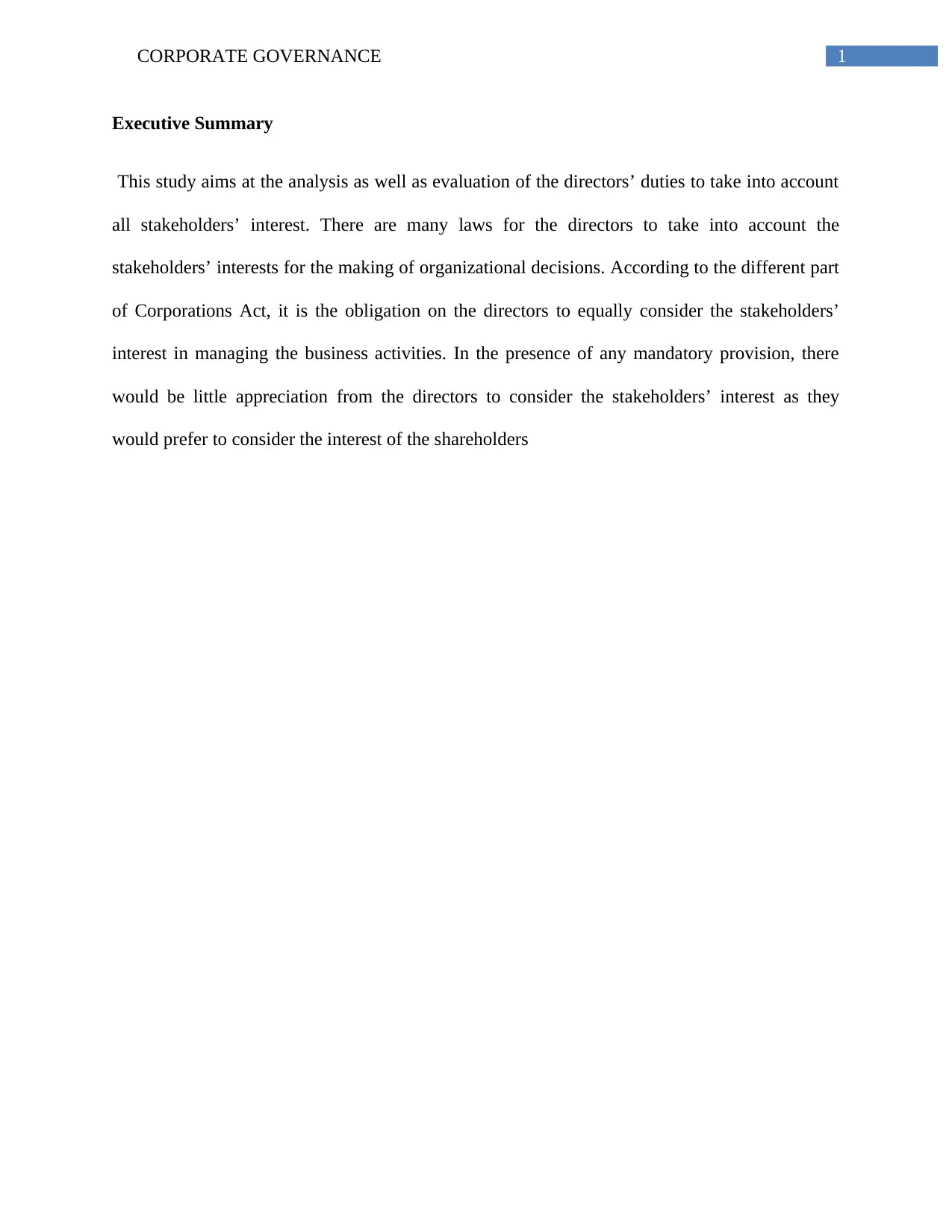
1CORPORATE GOVERNANCE
Executive Summary
This study aims at the analysis as well as evaluation of the directors’ duties to take into account
all stakeholders’ interest. There are many laws for the directors to take into account the
stakeholders’ interests for the making of organizational decisions. According to the different part
of Corporations Act, it is the obligation on the directors to equally consider the stakeholders’
interest in managing the business activities. In the presence of any mandatory provision, there
would be little appreciation from the directors to consider the stakeholders’ interest as they
would prefer to consider the interest of the shareholders
Executive Summary
This study aims at the analysis as well as evaluation of the directors’ duties to take into account
all stakeholders’ interest. There are many laws for the directors to take into account the
stakeholders’ interests for the making of organizational decisions. According to the different part
of Corporations Act, it is the obligation on the directors to equally consider the stakeholders’
interest in managing the business activities. In the presence of any mandatory provision, there
would be little appreciation from the directors to consider the stakeholders’ interest as they
would prefer to consider the interest of the shareholders
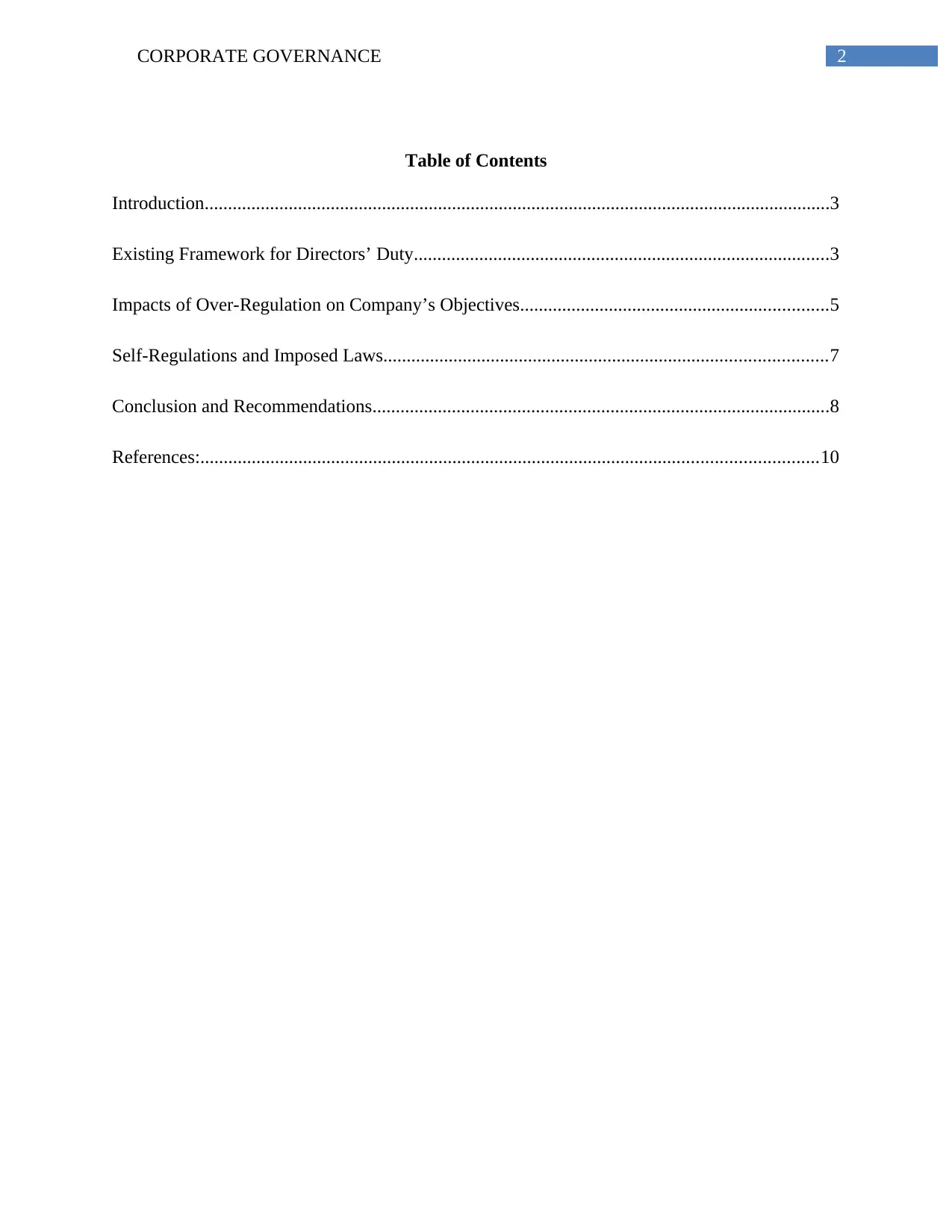
2CORPORATE GOVERNANCE
Table of Contents
Introduction......................................................................................................................................3
Existing Framework for Directors’ Duty.........................................................................................3
Impacts of Over-Regulation on Company’s Objectives..................................................................5
Self-Regulations and Imposed Laws...............................................................................................7
Conclusion and Recommendations..................................................................................................8
References:....................................................................................................................................10
Table of Contents
Introduction......................................................................................................................................3
Existing Framework for Directors’ Duty.........................................................................................3
Impacts of Over-Regulation on Company’s Objectives..................................................................5
Self-Regulations and Imposed Laws...............................................................................................7
Conclusion and Recommendations..................................................................................................8
References:....................................................................................................................................10
⊘ This is a preview!⊘
Do you want full access?
Subscribe today to unlock all pages.

Trusted by 1+ million students worldwide
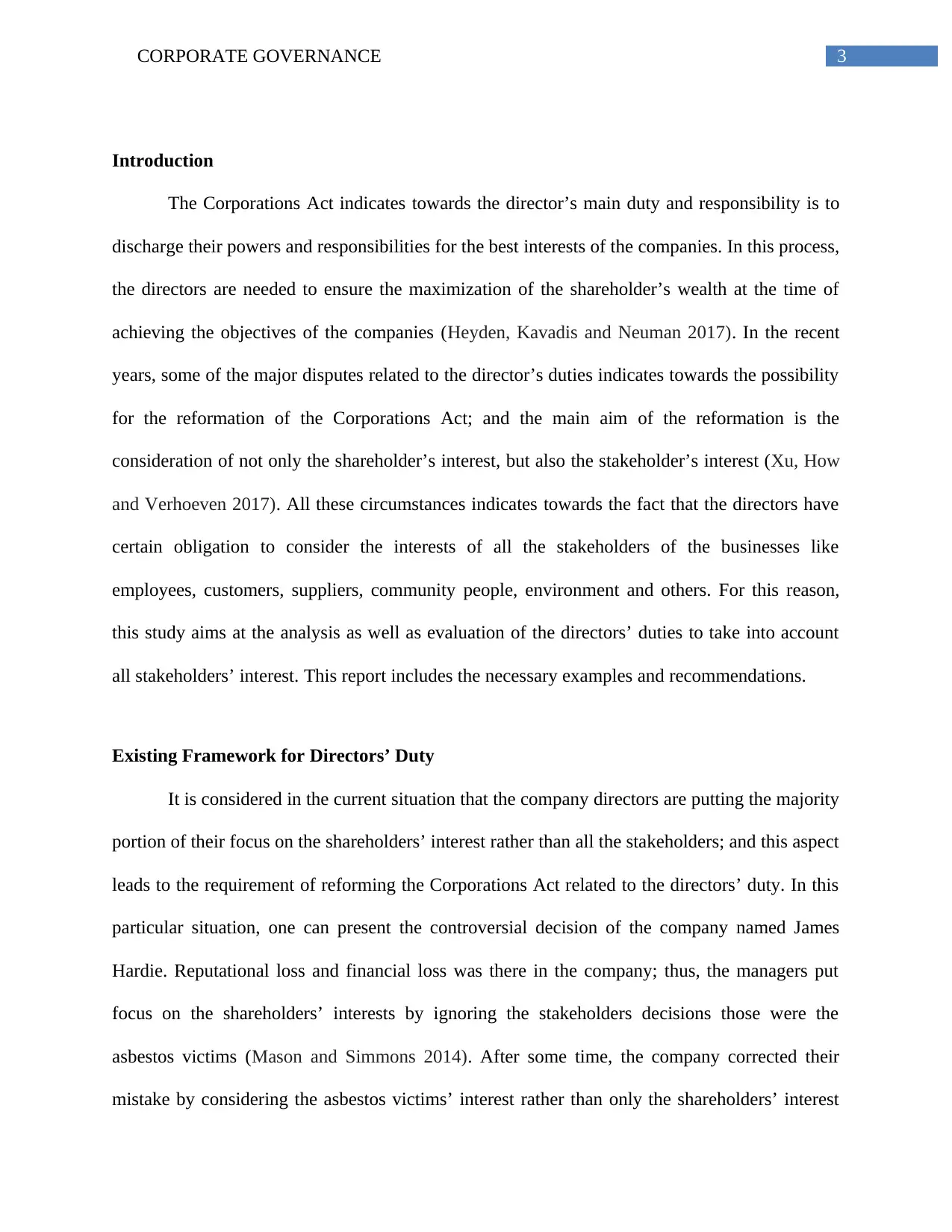
3CORPORATE GOVERNANCE
Introduction
The Corporations Act indicates towards the director’s main duty and responsibility is to
discharge their powers and responsibilities for the best interests of the companies. In this process,
the directors are needed to ensure the maximization of the shareholder’s wealth at the time of
achieving the objectives of the companies (Heyden, Kavadis and Neuman 2017). In the recent
years, some of the major disputes related to the director’s duties indicates towards the possibility
for the reformation of the Corporations Act; and the main aim of the reformation is the
consideration of not only the shareholder’s interest, but also the stakeholder’s interest (Xu, How
and Verhoeven 2017). All these circumstances indicates towards the fact that the directors have
certain obligation to consider the interests of all the stakeholders of the businesses like
employees, customers, suppliers, community people, environment and others. For this reason,
this study aims at the analysis as well as evaluation of the directors’ duties to take into account
all stakeholders’ interest. This report includes the necessary examples and recommendations.
Existing Framework for Directors’ Duty
It is considered in the current situation that the company directors are putting the majority
portion of their focus on the shareholders’ interest rather than all the stakeholders; and this aspect
leads to the requirement of reforming the Corporations Act related to the directors’ duty. In this
particular situation, one can present the controversial decision of the company named James
Hardie. Reputational loss and financial loss was there in the company; thus, the managers put
focus on the shareholders’ interests by ignoring the stakeholders decisions those were the
asbestos victims (Mason and Simmons 2014). After some time, the company corrected their
mistake by considering the asbestos victims’ interest rather than only the shareholders’ interest
Introduction
The Corporations Act indicates towards the director’s main duty and responsibility is to
discharge their powers and responsibilities for the best interests of the companies. In this process,
the directors are needed to ensure the maximization of the shareholder’s wealth at the time of
achieving the objectives of the companies (Heyden, Kavadis and Neuman 2017). In the recent
years, some of the major disputes related to the director’s duties indicates towards the possibility
for the reformation of the Corporations Act; and the main aim of the reformation is the
consideration of not only the shareholder’s interest, but also the stakeholder’s interest (Xu, How
and Verhoeven 2017). All these circumstances indicates towards the fact that the directors have
certain obligation to consider the interests of all the stakeholders of the businesses like
employees, customers, suppliers, community people, environment and others. For this reason,
this study aims at the analysis as well as evaluation of the directors’ duties to take into account
all stakeholders’ interest. This report includes the necessary examples and recommendations.
Existing Framework for Directors’ Duty
It is considered in the current situation that the company directors are putting the majority
portion of their focus on the shareholders’ interest rather than all the stakeholders; and this aspect
leads to the requirement of reforming the Corporations Act related to the directors’ duty. In this
particular situation, one can present the controversial decision of the company named James
Hardie. Reputational loss and financial loss was there in the company; thus, the managers put
focus on the shareholders’ interests by ignoring the stakeholders decisions those were the
asbestos victims (Mason and Simmons 2014). After some time, the company corrected their
mistake by considering the asbestos victims’ interest rather than only the shareholders’ interest
Paraphrase This Document
Need a fresh take? Get an instant paraphrase of this document with our AI Paraphraser
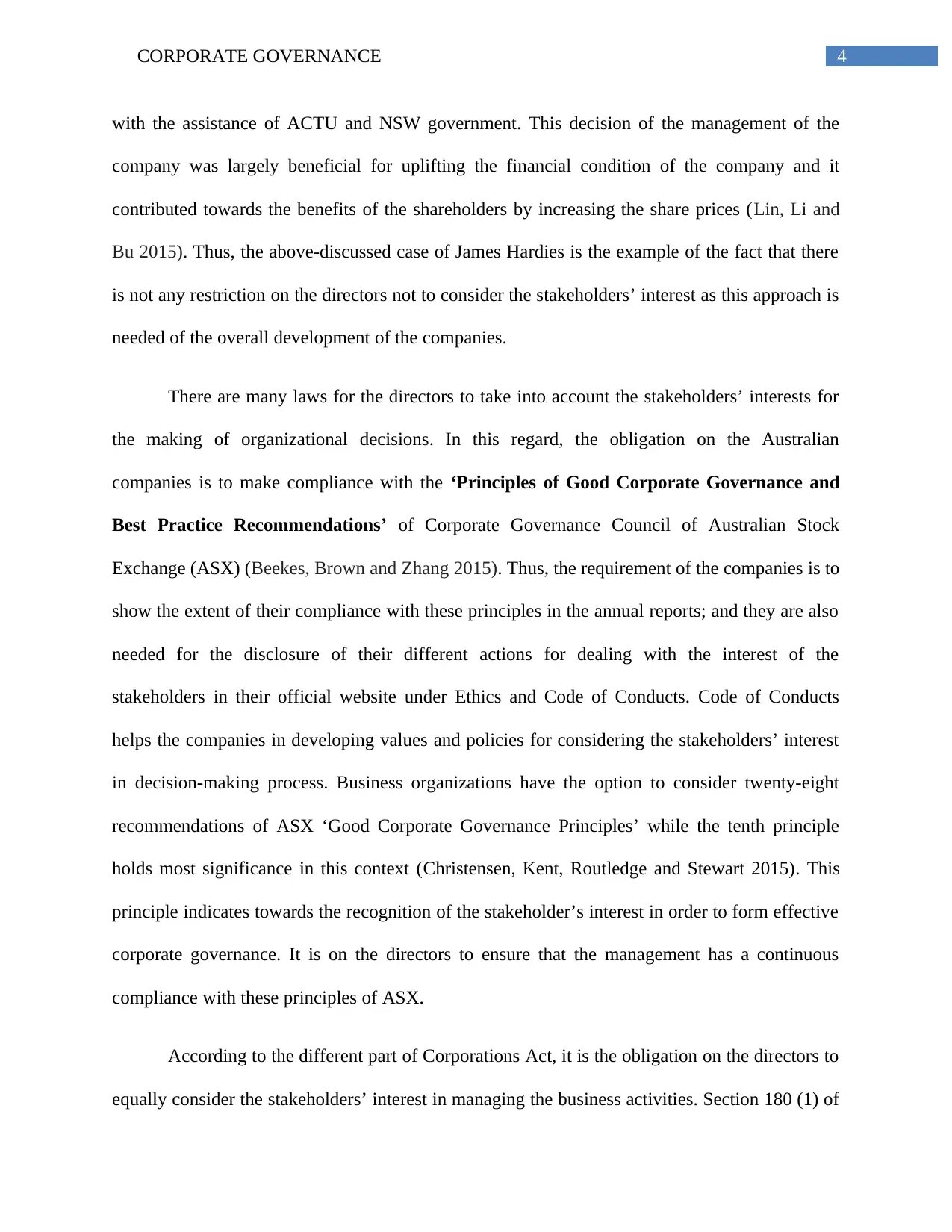
4CORPORATE GOVERNANCE
with the assistance of ACTU and NSW government. This decision of the management of the
company was largely beneficial for uplifting the financial condition of the company and it
contributed towards the benefits of the shareholders by increasing the share prices (Lin, Li and
Bu 2015). Thus, the above-discussed case of James Hardies is the example of the fact that there
is not any restriction on the directors not to consider the stakeholders’ interest as this approach is
needed of the overall development of the companies.
There are many laws for the directors to take into account the stakeholders’ interests for
the making of organizational decisions. In this regard, the obligation on the Australian
companies is to make compliance with the ‘Principles of Good Corporate Governance and
Best Practice Recommendations’ of Corporate Governance Council of Australian Stock
Exchange (ASX) (Beekes, Brown and Zhang 2015). Thus, the requirement of the companies is to
show the extent of their compliance with these principles in the annual reports; and they are also
needed for the disclosure of their different actions for dealing with the interest of the
stakeholders in their official website under Ethics and Code of Conducts. Code of Conducts
helps the companies in developing values and policies for considering the stakeholders’ interest
in decision-making process. Business organizations have the option to consider twenty-eight
recommendations of ASX ‘Good Corporate Governance Principles’ while the tenth principle
holds most significance in this context (Christensen, Kent, Routledge and Stewart 2015). This
principle indicates towards the recognition of the stakeholder’s interest in order to form effective
corporate governance. It is on the directors to ensure that the management has a continuous
compliance with these principles of ASX.
According to the different part of Corporations Act, it is the obligation on the directors to
equally consider the stakeholders’ interest in managing the business activities. Section 180 (1) of
with the assistance of ACTU and NSW government. This decision of the management of the
company was largely beneficial for uplifting the financial condition of the company and it
contributed towards the benefits of the shareholders by increasing the share prices (Lin, Li and
Bu 2015). Thus, the above-discussed case of James Hardies is the example of the fact that there
is not any restriction on the directors not to consider the stakeholders’ interest as this approach is
needed of the overall development of the companies.
There are many laws for the directors to take into account the stakeholders’ interests for
the making of organizational decisions. In this regard, the obligation on the Australian
companies is to make compliance with the ‘Principles of Good Corporate Governance and
Best Practice Recommendations’ of Corporate Governance Council of Australian Stock
Exchange (ASX) (Beekes, Brown and Zhang 2015). Thus, the requirement of the companies is to
show the extent of their compliance with these principles in the annual reports; and they are also
needed for the disclosure of their different actions for dealing with the interest of the
stakeholders in their official website under Ethics and Code of Conducts. Code of Conducts
helps the companies in developing values and policies for considering the stakeholders’ interest
in decision-making process. Business organizations have the option to consider twenty-eight
recommendations of ASX ‘Good Corporate Governance Principles’ while the tenth principle
holds most significance in this context (Christensen, Kent, Routledge and Stewart 2015). This
principle indicates towards the recognition of the stakeholder’s interest in order to form effective
corporate governance. It is on the directors to ensure that the management has a continuous
compliance with these principles of ASX.
According to the different part of Corporations Act, it is the obligation on the directors to
equally consider the stakeholders’ interest in managing the business activities. Section 180 (1) of
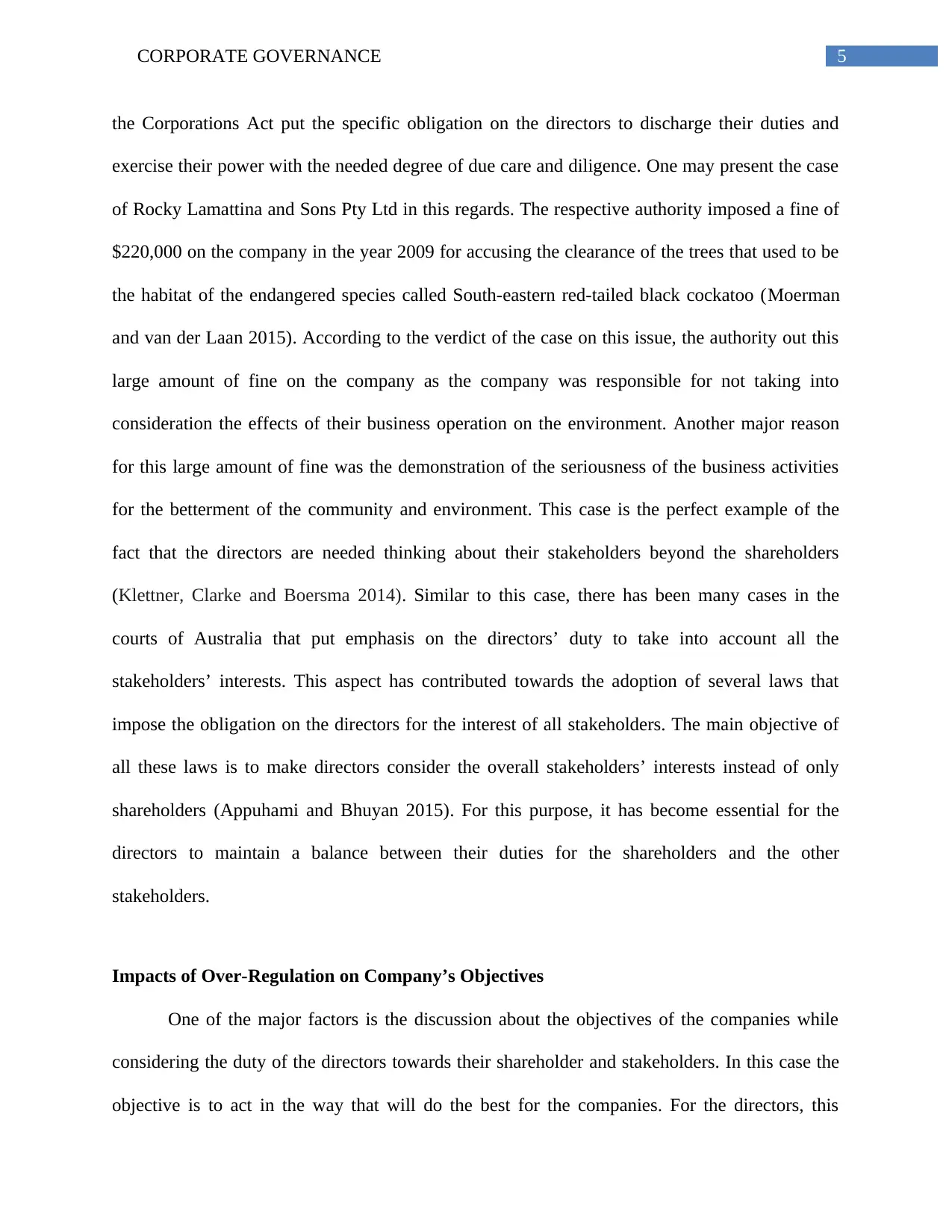
5CORPORATE GOVERNANCE
the Corporations Act put the specific obligation on the directors to discharge their duties and
exercise their power with the needed degree of due care and diligence. One may present the case
of Rocky Lamattina and Sons Pty Ltd in this regards. The respective authority imposed a fine of
$220,000 on the company in the year 2009 for accusing the clearance of the trees that used to be
the habitat of the endangered species called South-eastern red-tailed black cockatoo (Moerman
and van der Laan 2015). According to the verdict of the case on this issue, the authority out this
large amount of fine on the company as the company was responsible for not taking into
consideration the effects of their business operation on the environment. Another major reason
for this large amount of fine was the demonstration of the seriousness of the business activities
for the betterment of the community and environment. This case is the perfect example of the
fact that the directors are needed thinking about their stakeholders beyond the shareholders
(Klettner, Clarke and Boersma 2014). Similar to this case, there has been many cases in the
courts of Australia that put emphasis on the directors’ duty to take into account all the
stakeholders’ interests. This aspect has contributed towards the adoption of several laws that
impose the obligation on the directors for the interest of all stakeholders. The main objective of
all these laws is to make directors consider the overall stakeholders’ interests instead of only
shareholders (Appuhami and Bhuyan 2015). For this purpose, it has become essential for the
directors to maintain a balance between their duties for the shareholders and the other
stakeholders.
Impacts of Over-Regulation on Company’s Objectives
One of the major factors is the discussion about the objectives of the companies while
considering the duty of the directors towards their shareholder and stakeholders. In this case the
objective is to act in the way that will do the best for the companies. For the directors, this
the Corporations Act put the specific obligation on the directors to discharge their duties and
exercise their power with the needed degree of due care and diligence. One may present the case
of Rocky Lamattina and Sons Pty Ltd in this regards. The respective authority imposed a fine of
$220,000 on the company in the year 2009 for accusing the clearance of the trees that used to be
the habitat of the endangered species called South-eastern red-tailed black cockatoo (Moerman
and van der Laan 2015). According to the verdict of the case on this issue, the authority out this
large amount of fine on the company as the company was responsible for not taking into
consideration the effects of their business operation on the environment. Another major reason
for this large amount of fine was the demonstration of the seriousness of the business activities
for the betterment of the community and environment. This case is the perfect example of the
fact that the directors are needed thinking about their stakeholders beyond the shareholders
(Klettner, Clarke and Boersma 2014). Similar to this case, there has been many cases in the
courts of Australia that put emphasis on the directors’ duty to take into account all the
stakeholders’ interests. This aspect has contributed towards the adoption of several laws that
impose the obligation on the directors for the interest of all stakeholders. The main objective of
all these laws is to make directors consider the overall stakeholders’ interests instead of only
shareholders (Appuhami and Bhuyan 2015). For this purpose, it has become essential for the
directors to maintain a balance between their duties for the shareholders and the other
stakeholders.
Impacts of Over-Regulation on Company’s Objectives
One of the major factors is the discussion about the objectives of the companies while
considering the duty of the directors towards their shareholder and stakeholders. In this case the
objective is to act in the way that will do the best for the companies. For the directors, this
⊘ This is a preview!⊘
Do you want full access?
Subscribe today to unlock all pages.

Trusted by 1+ million students worldwide
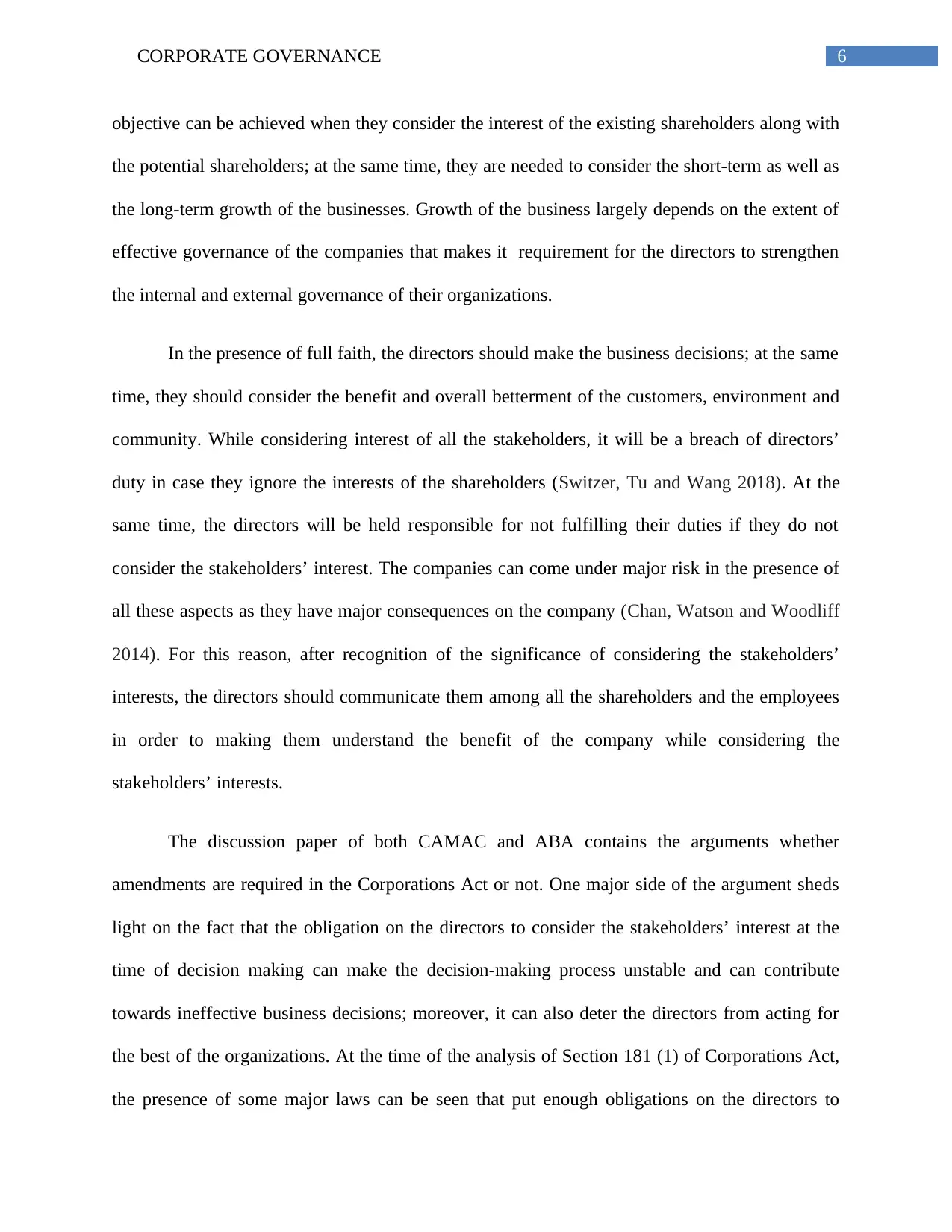
6CORPORATE GOVERNANCE
objective can be achieved when they consider the interest of the existing shareholders along with
the potential shareholders; at the same time, they are needed to consider the short-term as well as
the long-term growth of the businesses. Growth of the business largely depends on the extent of
effective governance of the companies that makes it requirement for the directors to strengthen
the internal and external governance of their organizations.
In the presence of full faith, the directors should make the business decisions; at the same
time, they should consider the benefit and overall betterment of the customers, environment and
community. While considering interest of all the stakeholders, it will be a breach of directors’
duty in case they ignore the interests of the shareholders (Switzer, Tu and Wang 2018). At the
same time, the directors will be held responsible for not fulfilling their duties if they do not
consider the stakeholders’ interest. The companies can come under major risk in the presence of
all these aspects as they have major consequences on the company (Chan, Watson and Woodliff
2014). For this reason, after recognition of the significance of considering the stakeholders’
interests, the directors should communicate them among all the shareholders and the employees
in order to making them understand the benefit of the company while considering the
stakeholders’ interests.
The discussion paper of both CAMAC and ABA contains the arguments whether
amendments are required in the Corporations Act or not. One major side of the argument sheds
light on the fact that the obligation on the directors to consider the stakeholders’ interest at the
time of decision making can make the decision-making process unstable and can contribute
towards ineffective business decisions; moreover, it can also deter the directors from acting for
the best of the organizations. At the time of the analysis of Section 181 (1) of Corporations Act,
the presence of some major laws can be seen that put enough obligations on the directors to
objective can be achieved when they consider the interest of the existing shareholders along with
the potential shareholders; at the same time, they are needed to consider the short-term as well as
the long-term growth of the businesses. Growth of the business largely depends on the extent of
effective governance of the companies that makes it requirement for the directors to strengthen
the internal and external governance of their organizations.
In the presence of full faith, the directors should make the business decisions; at the same
time, they should consider the benefit and overall betterment of the customers, environment and
community. While considering interest of all the stakeholders, it will be a breach of directors’
duty in case they ignore the interests of the shareholders (Switzer, Tu and Wang 2018). At the
same time, the directors will be held responsible for not fulfilling their duties if they do not
consider the stakeholders’ interest. The companies can come under major risk in the presence of
all these aspects as they have major consequences on the company (Chan, Watson and Woodliff
2014). For this reason, after recognition of the significance of considering the stakeholders’
interests, the directors should communicate them among all the shareholders and the employees
in order to making them understand the benefit of the company while considering the
stakeholders’ interests.
The discussion paper of both CAMAC and ABA contains the arguments whether
amendments are required in the Corporations Act or not. One major side of the argument sheds
light on the fact that the obligation on the directors to consider the stakeholders’ interest at the
time of decision making can make the decision-making process unstable and can contribute
towards ineffective business decisions; moreover, it can also deter the directors from acting for
the best of the organizations. At the time of the analysis of Section 181 (1) of Corporations Act,
the presence of some major laws can be seen that put enough obligations on the directors to
Paraphrase This Document
Need a fresh take? Get an instant paraphrase of this document with our AI Paraphraser
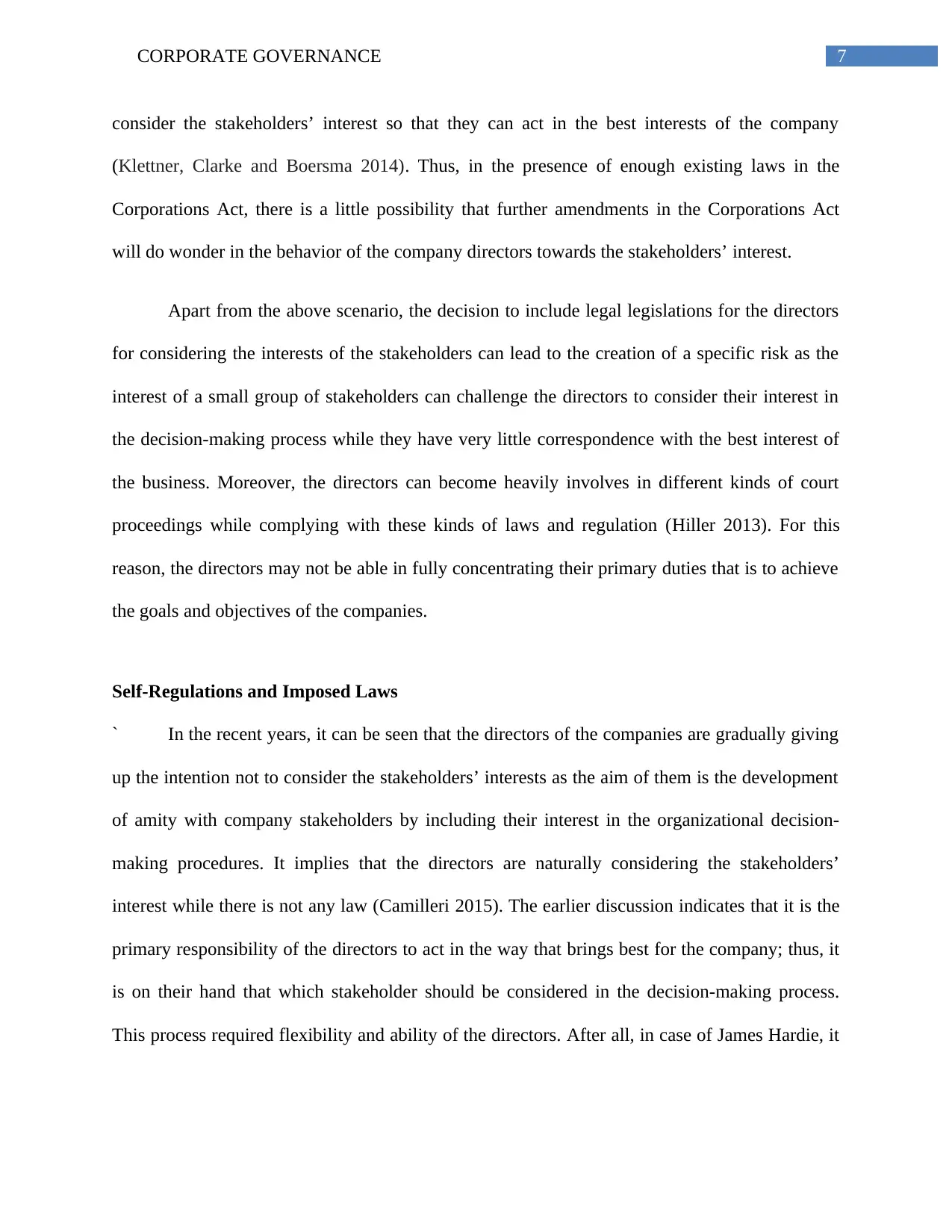
7CORPORATE GOVERNANCE
consider the stakeholders’ interest so that they can act in the best interests of the company
(Klettner, Clarke and Boersma 2014). Thus, in the presence of enough existing laws in the
Corporations Act, there is a little possibility that further amendments in the Corporations Act
will do wonder in the behavior of the company directors towards the stakeholders’ interest.
Apart from the above scenario, the decision to include legal legislations for the directors
for considering the interests of the stakeholders can lead to the creation of a specific risk as the
interest of a small group of stakeholders can challenge the directors to consider their interest in
the decision-making process while they have very little correspondence with the best interest of
the business. Moreover, the directors can become heavily involves in different kinds of court
proceedings while complying with these kinds of laws and regulation (Hiller 2013). For this
reason, the directors may not be able in fully concentrating their primary duties that is to achieve
the goals and objectives of the companies.
Self-Regulations and Imposed Laws
` In the recent years, it can be seen that the directors of the companies are gradually giving
up the intention not to consider the stakeholders’ interests as the aim of them is the development
of amity with company stakeholders by including their interest in the organizational decision-
making procedures. It implies that the directors are naturally considering the stakeholders’
interest while there is not any law (Camilleri 2015). The earlier discussion indicates that it is the
primary responsibility of the directors to act in the way that brings best for the company; thus, it
is on their hand that which stakeholder should be considered in the decision-making process.
This process required flexibility and ability of the directors. After all, in case of James Hardie, it
consider the stakeholders’ interest so that they can act in the best interests of the company
(Klettner, Clarke and Boersma 2014). Thus, in the presence of enough existing laws in the
Corporations Act, there is a little possibility that further amendments in the Corporations Act
will do wonder in the behavior of the company directors towards the stakeholders’ interest.
Apart from the above scenario, the decision to include legal legislations for the directors
for considering the interests of the stakeholders can lead to the creation of a specific risk as the
interest of a small group of stakeholders can challenge the directors to consider their interest in
the decision-making process while they have very little correspondence with the best interest of
the business. Moreover, the directors can become heavily involves in different kinds of court
proceedings while complying with these kinds of laws and regulation (Hiller 2013). For this
reason, the directors may not be able in fully concentrating their primary duties that is to achieve
the goals and objectives of the companies.
Self-Regulations and Imposed Laws
` In the recent years, it can be seen that the directors of the companies are gradually giving
up the intention not to consider the stakeholders’ interests as the aim of them is the development
of amity with company stakeholders by including their interest in the organizational decision-
making procedures. It implies that the directors are naturally considering the stakeholders’
interest while there is not any law (Camilleri 2015). The earlier discussion indicates that it is the
primary responsibility of the directors to act in the way that brings best for the company; thus, it
is on their hand that which stakeholder should be considered in the decision-making process.
This process required flexibility and ability of the directors. After all, in case of James Hardie, it
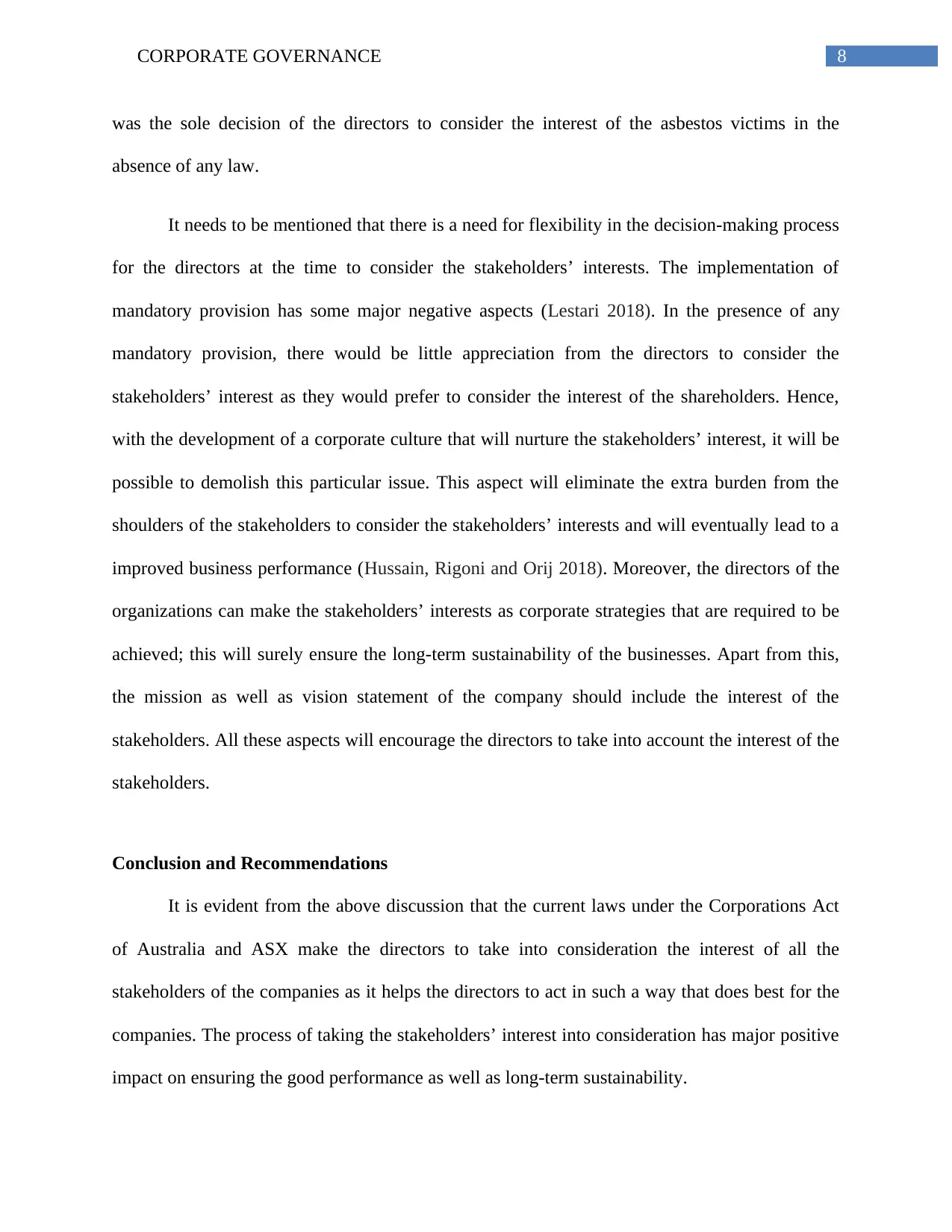
8CORPORATE GOVERNANCE
was the sole decision of the directors to consider the interest of the asbestos victims in the
absence of any law.
It needs to be mentioned that there is a need for flexibility in the decision-making process
for the directors at the time to consider the stakeholders’ interests. The implementation of
mandatory provision has some major negative aspects (Lestari 2018). In the presence of any
mandatory provision, there would be little appreciation from the directors to consider the
stakeholders’ interest as they would prefer to consider the interest of the shareholders. Hence,
with the development of a corporate culture that will nurture the stakeholders’ interest, it will be
possible to demolish this particular issue. This aspect will eliminate the extra burden from the
shoulders of the stakeholders to consider the stakeholders’ interests and will eventually lead to a
improved business performance (Hussain, Rigoni and Orij 2018). Moreover, the directors of the
organizations can make the stakeholders’ interests as corporate strategies that are required to be
achieved; this will surely ensure the long-term sustainability of the businesses. Apart from this,
the mission as well as vision statement of the company should include the interest of the
stakeholders. All these aspects will encourage the directors to take into account the interest of the
stakeholders.
Conclusion and Recommendations
It is evident from the above discussion that the current laws under the Corporations Act
of Australia and ASX make the directors to take into consideration the interest of all the
stakeholders of the companies as it helps the directors to act in such a way that does best for the
companies. The process of taking the stakeholders’ interest into consideration has major positive
impact on ensuring the good performance as well as long-term sustainability.
was the sole decision of the directors to consider the interest of the asbestos victims in the
absence of any law.
It needs to be mentioned that there is a need for flexibility in the decision-making process
for the directors at the time to consider the stakeholders’ interests. The implementation of
mandatory provision has some major negative aspects (Lestari 2018). In the presence of any
mandatory provision, there would be little appreciation from the directors to consider the
stakeholders’ interest as they would prefer to consider the interest of the shareholders. Hence,
with the development of a corporate culture that will nurture the stakeholders’ interest, it will be
possible to demolish this particular issue. This aspect will eliminate the extra burden from the
shoulders of the stakeholders to consider the stakeholders’ interests and will eventually lead to a
improved business performance (Hussain, Rigoni and Orij 2018). Moreover, the directors of the
organizations can make the stakeholders’ interests as corporate strategies that are required to be
achieved; this will surely ensure the long-term sustainability of the businesses. Apart from this,
the mission as well as vision statement of the company should include the interest of the
stakeholders. All these aspects will encourage the directors to take into account the interest of the
stakeholders.
Conclusion and Recommendations
It is evident from the above discussion that the current laws under the Corporations Act
of Australia and ASX make the directors to take into consideration the interest of all the
stakeholders of the companies as it helps the directors to act in such a way that does best for the
companies. The process of taking the stakeholders’ interest into consideration has major positive
impact on ensuring the good performance as well as long-term sustainability.
⊘ This is a preview!⊘
Do you want full access?
Subscribe today to unlock all pages.

Trusted by 1+ million students worldwide
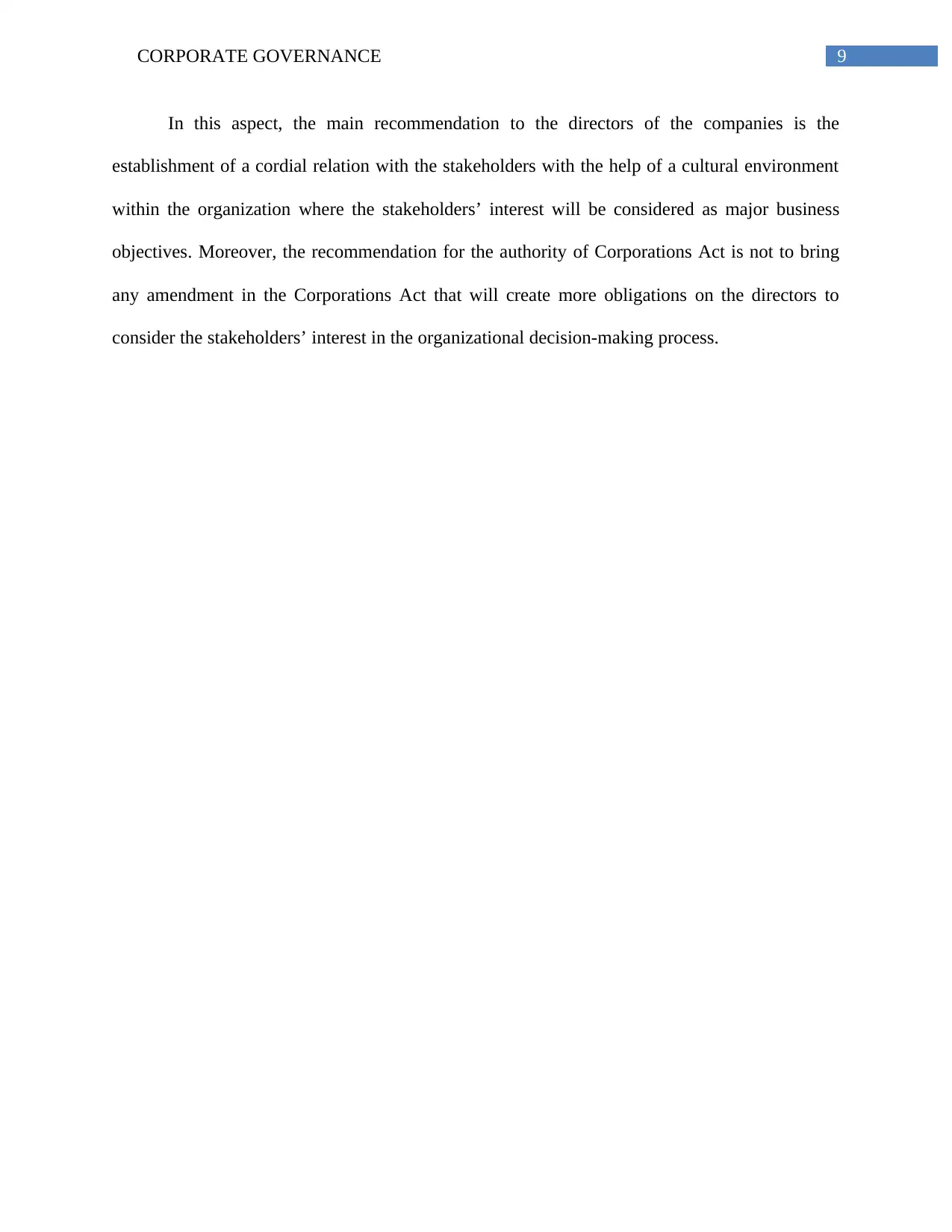
9CORPORATE GOVERNANCE
In this aspect, the main recommendation to the directors of the companies is the
establishment of a cordial relation with the stakeholders with the help of a cultural environment
within the organization where the stakeholders’ interest will be considered as major business
objectives. Moreover, the recommendation for the authority of Corporations Act is not to bring
any amendment in the Corporations Act that will create more obligations on the directors to
consider the stakeholders’ interest in the organizational decision-making process.
In this aspect, the main recommendation to the directors of the companies is the
establishment of a cordial relation with the stakeholders with the help of a cultural environment
within the organization where the stakeholders’ interest will be considered as major business
objectives. Moreover, the recommendation for the authority of Corporations Act is not to bring
any amendment in the Corporations Act that will create more obligations on the directors to
consider the stakeholders’ interest in the organizational decision-making process.
Paraphrase This Document
Need a fresh take? Get an instant paraphrase of this document with our AI Paraphraser
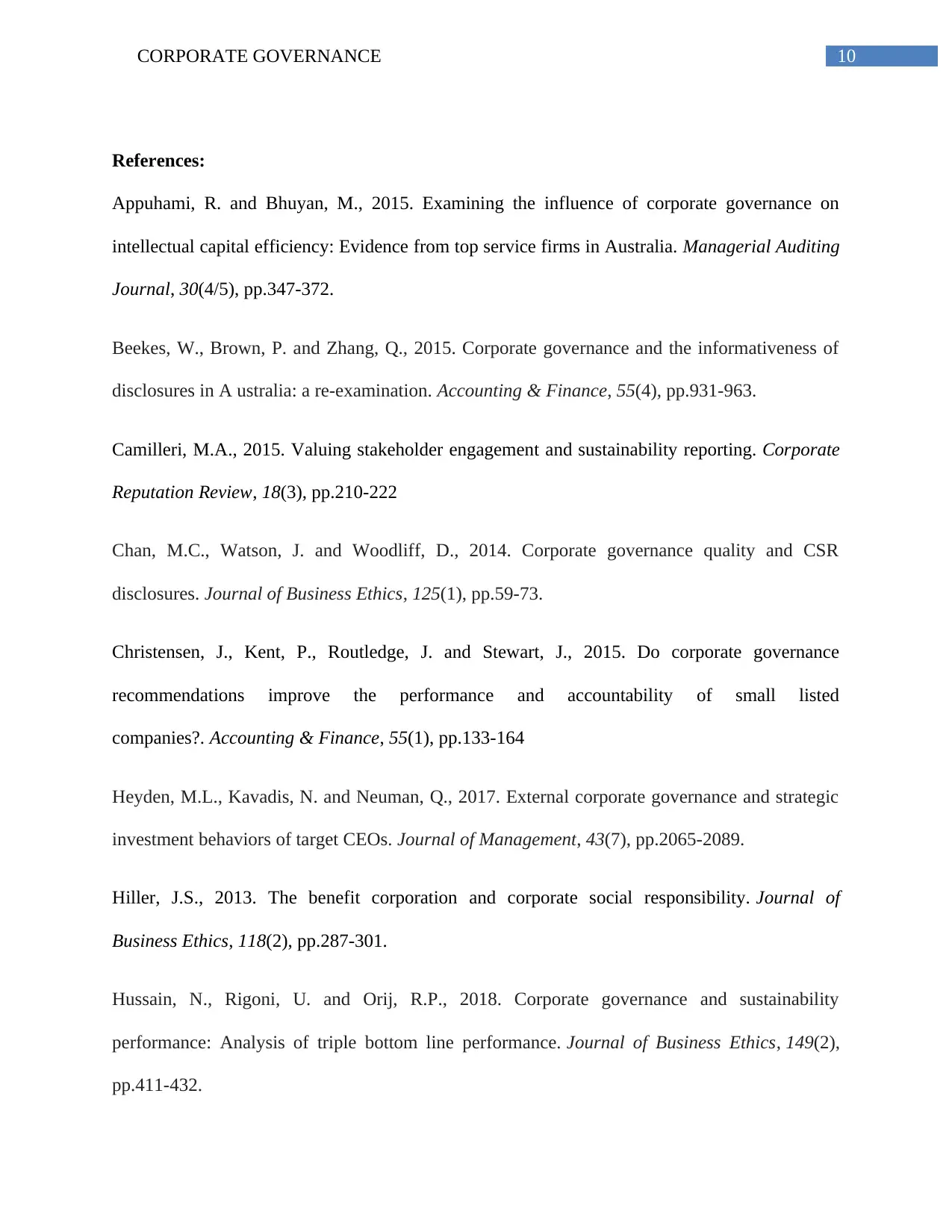
10CORPORATE GOVERNANCE
References:
Appuhami, R. and Bhuyan, M., 2015. Examining the influence of corporate governance on
intellectual capital efficiency: Evidence from top service firms in Australia. Managerial Auditing
Journal, 30(4/5), pp.347-372.
Beekes, W., Brown, P. and Zhang, Q., 2015. Corporate governance and the informativeness of
disclosures in A ustralia: a re‐examination. Accounting & Finance, 55(4), pp.931-963.
Camilleri, M.A., 2015. Valuing stakeholder engagement and sustainability reporting. Corporate
Reputation Review, 18(3), pp.210-222
Chan, M.C., Watson, J. and Woodliff, D., 2014. Corporate governance quality and CSR
disclosures. Journal of Business Ethics, 125(1), pp.59-73.
Christensen, J., Kent, P., Routledge, J. and Stewart, J., 2015. Do corporate governance
recommendations improve the performance and accountability of small listed
companies?. Accounting & Finance, 55(1), pp.133-164
Heyden, M.L., Kavadis, N. and Neuman, Q., 2017. External corporate governance and strategic
investment behaviors of target CEOs. Journal of Management, 43(7), pp.2065-2089.
Hiller, J.S., 2013. The benefit corporation and corporate social responsibility. Journal of
Business Ethics, 118(2), pp.287-301.
Hussain, N., Rigoni, U. and Orij, R.P., 2018. Corporate governance and sustainability
performance: Analysis of triple bottom line performance. Journal of Business Ethics, 149(2),
pp.411-432.
References:
Appuhami, R. and Bhuyan, M., 2015. Examining the influence of corporate governance on
intellectual capital efficiency: Evidence from top service firms in Australia. Managerial Auditing
Journal, 30(4/5), pp.347-372.
Beekes, W., Brown, P. and Zhang, Q., 2015. Corporate governance and the informativeness of
disclosures in A ustralia: a re‐examination. Accounting & Finance, 55(4), pp.931-963.
Camilleri, M.A., 2015. Valuing stakeholder engagement and sustainability reporting. Corporate
Reputation Review, 18(3), pp.210-222
Chan, M.C., Watson, J. and Woodliff, D., 2014. Corporate governance quality and CSR
disclosures. Journal of Business Ethics, 125(1), pp.59-73.
Christensen, J., Kent, P., Routledge, J. and Stewart, J., 2015. Do corporate governance
recommendations improve the performance and accountability of small listed
companies?. Accounting & Finance, 55(1), pp.133-164
Heyden, M.L., Kavadis, N. and Neuman, Q., 2017. External corporate governance and strategic
investment behaviors of target CEOs. Journal of Management, 43(7), pp.2065-2089.
Hiller, J.S., 2013. The benefit corporation and corporate social responsibility. Journal of
Business Ethics, 118(2), pp.287-301.
Hussain, N., Rigoni, U. and Orij, R.P., 2018. Corporate governance and sustainability
performance: Analysis of triple bottom line performance. Journal of Business Ethics, 149(2),
pp.411-432.
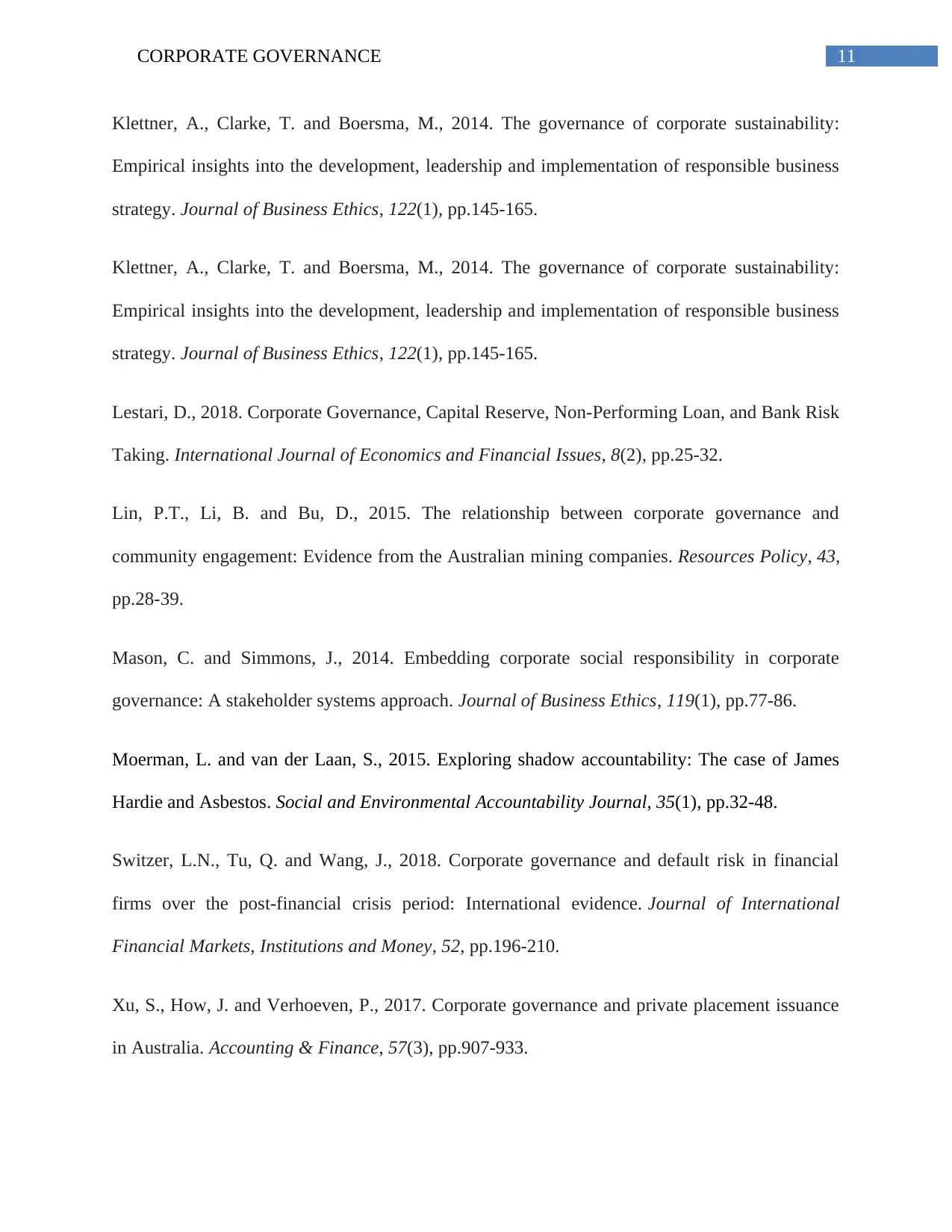
11CORPORATE GOVERNANCE
Klettner, A., Clarke, T. and Boersma, M., 2014. The governance of corporate sustainability:
Empirical insights into the development, leadership and implementation of responsible business
strategy. Journal of Business Ethics, 122(1), pp.145-165.
Klettner, A., Clarke, T. and Boersma, M., 2014. The governance of corporate sustainability:
Empirical insights into the development, leadership and implementation of responsible business
strategy. Journal of Business Ethics, 122(1), pp.145-165.
Lestari, D., 2018. Corporate Governance, Capital Reserve, Non-Performing Loan, and Bank Risk
Taking. International Journal of Economics and Financial Issues, 8(2), pp.25-32.
Lin, P.T., Li, B. and Bu, D., 2015. The relationship between corporate governance and
community engagement: Evidence from the Australian mining companies. Resources Policy, 43,
pp.28-39.
Mason, C. and Simmons, J., 2014. Embedding corporate social responsibility in corporate
governance: A stakeholder systems approach. Journal of Business Ethics, 119(1), pp.77-86.
Moerman, L. and van der Laan, S., 2015. Exploring shadow accountability: The case of James
Hardie and Asbestos. Social and Environmental Accountability Journal, 35(1), pp.32-48.
Switzer, L.N., Tu, Q. and Wang, J., 2018. Corporate governance and default risk in financial
firms over the post-financial crisis period: International evidence. Journal of International
Financial Markets, Institutions and Money, 52, pp.196-210.
Xu, S., How, J. and Verhoeven, P., 2017. Corporate governance and private placement issuance
in Australia. Accounting & Finance, 57(3), pp.907-933.
Klettner, A., Clarke, T. and Boersma, M., 2014. The governance of corporate sustainability:
Empirical insights into the development, leadership and implementation of responsible business
strategy. Journal of Business Ethics, 122(1), pp.145-165.
Klettner, A., Clarke, T. and Boersma, M., 2014. The governance of corporate sustainability:
Empirical insights into the development, leadership and implementation of responsible business
strategy. Journal of Business Ethics, 122(1), pp.145-165.
Lestari, D., 2018. Corporate Governance, Capital Reserve, Non-Performing Loan, and Bank Risk
Taking. International Journal of Economics and Financial Issues, 8(2), pp.25-32.
Lin, P.T., Li, B. and Bu, D., 2015. The relationship between corporate governance and
community engagement: Evidence from the Australian mining companies. Resources Policy, 43,
pp.28-39.
Mason, C. and Simmons, J., 2014. Embedding corporate social responsibility in corporate
governance: A stakeholder systems approach. Journal of Business Ethics, 119(1), pp.77-86.
Moerman, L. and van der Laan, S., 2015. Exploring shadow accountability: The case of James
Hardie and Asbestos. Social and Environmental Accountability Journal, 35(1), pp.32-48.
Switzer, L.N., Tu, Q. and Wang, J., 2018. Corporate governance and default risk in financial
firms over the post-financial crisis period: International evidence. Journal of International
Financial Markets, Institutions and Money, 52, pp.196-210.
Xu, S., How, J. and Verhoeven, P., 2017. Corporate governance and private placement issuance
in Australia. Accounting & Finance, 57(3), pp.907-933.
⊘ This is a preview!⊘
Do you want full access?
Subscribe today to unlock all pages.

Trusted by 1+ million students worldwide
1 out of 12
Related Documents
Your All-in-One AI-Powered Toolkit for Academic Success.
+13062052269
info@desklib.com
Available 24*7 on WhatsApp / Email
![[object Object]](/_next/static/media/star-bottom.7253800d.svg)
Unlock your academic potential
Copyright © 2020–2026 A2Z Services. All Rights Reserved. Developed and managed by ZUCOL.





